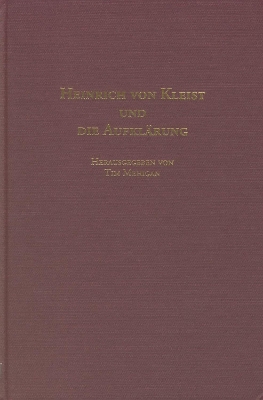The great and eccentric German writer Heinrich von Kleist, famous for his enigmatic dramas and novellas, read the Enlightenment philosopher Immanuel Kant in 1801. A series of letters written around this time speak of the distresshe felt as he absorbed the implications of Kantian thought. This sense of distress -- long considered important to understanding Kleist's subsequent works -- has become known to Kleist scholars as the 'Kant crisis,' and marks Kleist's abandonment of the hope of gaining metaphysical certainty about his life. But it has never been established which texts of Kant Kleist actually read, how well he understood them, and why they precipitated such despair. Kleisthimself -- aside from one paraphrasing of Kant in a letter of 1801 -- was never explicit about what he called this 'sad philosophy.' Yet the distress seems never to have left him and remains an abiding preoccupation throughout his dramas and stories.
This collection of essays, all in German language, represents the most recent work of prominent scholars in the field. It takes the pervasive sense of metaphysical crisis in Kleist's works as a startingpoint. In the context of Kleist's response to Kant, the essays deal with his subversive treatment of the literary motifs and genres of his day, and with the ambiguity of truth in his works -- for his characters and readers alike.In tracing the source of crisis to specific writings of Kant and to other Enlightenment thinkers such as Rousseau and Wieland, the essays show Kleist's complex dialogue with the Enlightenment to be an important new approach to understanding this notoriously difficult writer.
Tim Mehigan is Professor of German in the Department of Languages and Cultures at the University of Otago, New Zealand.
- ISBN10 1571130470
- ISBN13 9781571130471
- Publish Date 5 December 2000
- Publish Status Active
- Publish Country US
- Publisher Boydell & Brewer Ltd
- Imprint Camden House Inc
- Format Hardcover
- Pages 266
- Language German
